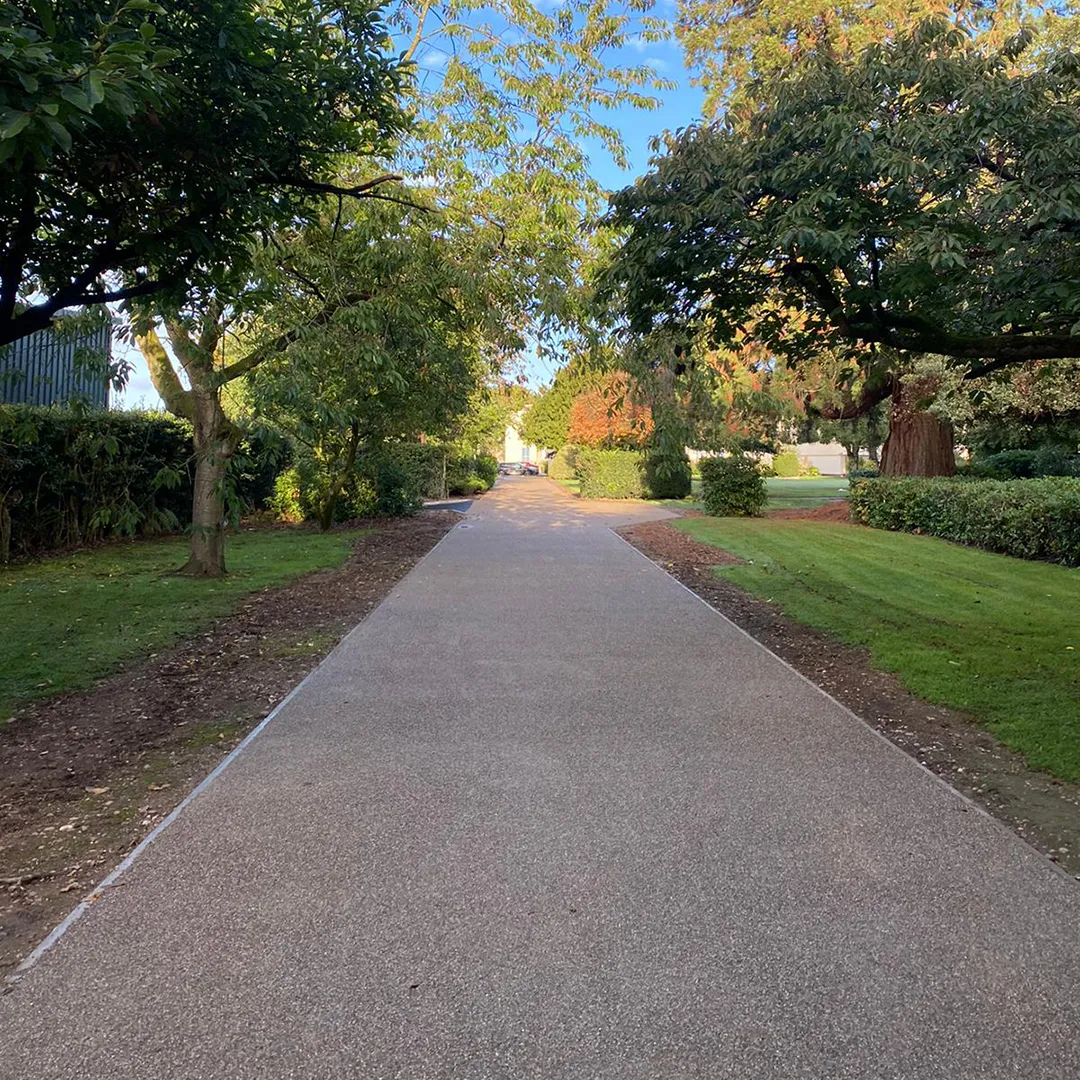 Add My Company
Add My Company

Resin bonded paving is a non-permeable, decorative surface that uses natural aggregates bonded with a high-performance resin to guarantee a durable, hard-wearing final product.
It is notoriously long-lasting, low maintenance and easy on the eye! The biggest difference to its resin bound counterpart, is that a resin bonded surface is sealed and therefore not porous.
Resin bonded paving can be applied to many surface types – if they are good quality. Surfaces such as tarmac or concrete are a perfect base for a resin bonded surface to be installed. The area will need to be cleared of weeds, dirt, and grease and must be dry before application. It can be applied to new or existing areas, reducing preparation work and costs involved with having the surface installed.
So, why choose resin bonded?
With a wide variety of colours and finishes to choose from, adding a high-quality touch to your resin project has never been more attainable or adaptable.
Once installed, no weeding would be necessary, the sealed surface would prevent 100% of weed growth. Very little stone migration, this makes it perfect for public footpaths and car parks. It is also highly durable and slip resistant, resulting in a great product for slopes and ramps, and is effective in cold/winter conditions. It is also environmentally friendly; its non-hazardous binder and natural aggregates don’t put a strain on the area it is laid in – or the wildlife around it!
So, what is resin bonded paving used for?
Resin bonded paving is a popular choice for various projects due to its aesthetic appeal, durability, and low maintenance requirements. Here are some reasons why you might choose resin bonded paving for your project:
- Visual Appeal: Resin bonded paving offers a visually striking finish that can enhance the appearance of driveways, pathways, and other outdoor spaces. It is available in a wide range of colours and aggregate options, allowing for customization and creative designs.
- Durability: Resin bonded paving is highly durable and can withstand heavy foot traffic, vehicular loads, and weather conditions. The resin binds the aggregates tightly together, creating a strong and resilient surface.
- Low Maintenance: Once installed, resin bonded paving requires minimal maintenance. It is resistant to weed growth, and its smooth surface makes it easy to clean. Regular sweeping and occasional power washing is usually sufficient to keep it looking good.
- Quick Installation: Resin bonded paving can be installed relatively quickly compared to other paving methods. This is because it doesn’t require the extensive groundwork of traditional paving techniques.
Regarding permeability, resin bonded paving is not inherently permeable. The resin acts as a non-permeable barrier that forms a sealed surface. However, it is worth noting that some resin systems can be formulated to be permeable, allowing for water drainage. If permeability is a concern, you can explore resin bound paving, which consists of aggregates mixed with resin and provides a porous surface.
When installing resin bonded paving, the following steps are typically involved:
- Base Preparation: The base needs to be stable, firm, and free from any damage. It is usually constructed using a suitable sub-base material like compacted hardcore or asphalt.
- Base Inspection: Before proceeding, the base should be checked for any cracks, potholes, or other damages. Any existing issues should be repaired to ensure a smooth and even surface.
- Base Cleaning: The base should be thoroughly cleaned to remove any debris, dust, or loose particles. This can be done using a broom or a high-pressure washer.
- Base Sealing: To enhance adhesion, a primer or sealer is applied to the cleaned and dry base. This helps to create a strong bond between the base and the resin.
- Applying Resin Bonded Aggregates: The resin is mixed with the chosen aggregates and spread evenly over the prepared base. The resin is then leveled out using a trowel or squeegee, and the aggregates are scattered onto the resin until a desired thickness is achieved. Excess aggregates are removed once the resin has cured.
It’s important to note that specific installation processes may vary depending on the manufacturer’s instructions and the requirements of your project. It’s advisable to consult us here at HMS or follow the guidelines provided on our website.
To conclude, resin bonded paving offers a range of benefits that make it a popular choice for various outdoor projects. Its visual appeal, durability, low maintenance requirements, and relatively quick installation process make it an attractive option for driveways, pathways, and other surfaces.
While resin bonded paving is not permeable, there are permeable resin systems available for those who require water drainage. Additionally, resin bound paving can be considered if permeability is a crucial factor.
When installing resin bonded paving, proper base preparation is essential. The base should be stable, inspected for damage, and thoroughly cleaned before applying a primer or sealer to enhance adhesion. The resin is then mixed with aggregates and applied evenly over the prepared base, followed by the scattering of aggregates and removal of excess once the resin has cured.
By considering resin bonded paving for your project, you can achieve a visually striking, durable, and low-maintenance surface that enhances the overall aesthetic and functionality of your outdoor space. Consulting professional installers and following the manufacturer’s guidelines will help ensure a successful installation and maximize the benefits of resin bonded paving.
For more information on What is resin bonded paving – and what makes it different to resin bound? talk to HMS Decorative Surfacing Ltd
